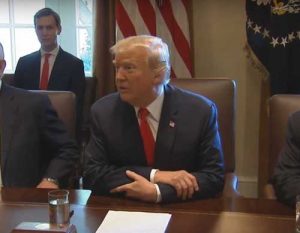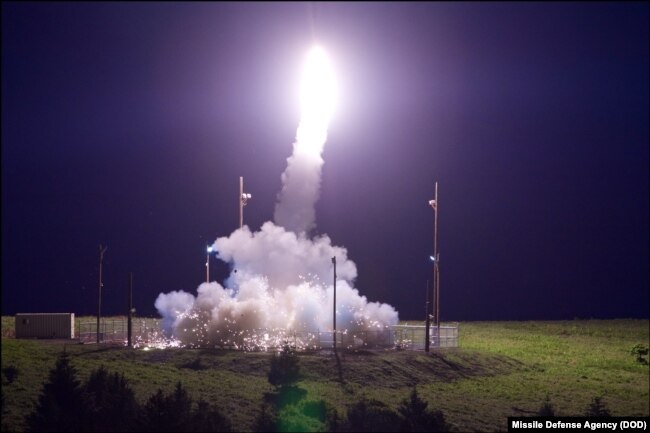
WHITE HOUSE — President Donald Trump warned Thursday that “it will be a very sad day for North Korea” if the United States takes military action against it.
The president, in a news conference in the White House East Room, answered a reporter’s question by saying “hopefully, we’re not going to have to use it [military force] on North Korea.”
Trump declined twice to respond to a question about whether it would be acceptable for a “contained and deterred” North Korea to keep its nuclear weapons.
“I’m not negotiating with you,” the president said at the news conference, held with Kuwait’s emir, Sheikh Sabah Al-Ahmad Al-Jaber Al-Sabah. “Maybe we’ll have a chance to negotiate with somebody else, but I don’t put my negotiations on the table, unlike past administrations. But I can tell you that North Korea is behaving badly and it’s got to stop.”
Trump contended that for the past 25 years, U.S. administrations have experienced that “the day after an agreement is reached, new work begins in North Korea, continuation on nuclear.”
After the president’s comments, a senior Trump administration official expressed concern that North Korea could not be deterred.
Grave risk of miscalculation
Speaking to reporters, the official said there was a grave risk North Korean leader Kim Jong Un could miscalculate the U.S. response to its provocations. The official warned that Pyongyang should not “underestimate American will to protect ourselves and our allies.”
North Korea claims it detonated a hydrogen bomb on Sunday at its Punggye-ri nuclear test site.
“So far, there’s nothing inconsistent with the North Korean claim that this was a hydrogen bomb,” according to a senior U.S. official. “But we don’t have a conclusive view on it yet.”
Sue Gordon, principal deputy director of national intelligence, said at a security summit on Thursday, “North Korea is vexing. They are on a path that seems inexorable with capability that is advancing every day with demonstrations that prove that their aspirations are not a pipe dream.”
Trump, in past days, has phoned key counterparts in Asia and Europe.
China said it would support further U.N. measures against Pyongyang in response to North Korea’s sixth nuclear test.
“Given the new developments on the Korean Peninsula, the U.N. Security Council should respond further and take necessary measures” to deal with the crisis, Foreign Minister Wang Yi said Thursday during a news conference in Beijing. But he also stressed that “sanctions and pressure” must go hand in hand with “dialogue and negotiation” with Pyongyang.
China is North Korea’s biggest diplomatic and economic ally and contends that tighter sanctions against Pyongyang will do little to ease tensions on the Korean Peninsula.
Japanese Prime Minister Shinzo Abe and South Korean President Moon Jae-in joined forces Thursday in calling for further diplomatic and economic pressure to be placed on Pyongyang. The two leaders, meeting on the sidelines of an economic summit in Vladivostok, Russia, said they would increase their efforts to persuade China and Russia to back harsh new sanctions on Pyongyang.
Seeking new sanctions
The United States has circulated a draft resolution of new U.N. sanctions on North Korea to Security Council members, pushing to get it to a vote next Monday.
The draft, obtained by VOA, calls for a ban on the sale of oil, refined petroleum products and natural gas liquids to North Korea.
Pyongyang imports nearly all of its oil and gas from China. Without the fuel, experts say, the economy would quickly be strangled.
The U.S. draft also aims to cut off exports of North Korean textiles, which account for hundreds of millions of dollars in annual revenue.[xyz-ihs snippet=”Adsense-responsive”]It also seeks to tighten restrictions on North Korea’s ability to send its citizens to work in foreign countries, where they often are required to send their salaries home to the government.
On Thursday, Russian President Vladimir Putin said he and Abe “decisively condemn” the latest North Korean missile launch, adding he would like the crisis to be resolved through a road map devised by Moscow and Beijing.
Early Friday, the Philippines announced it had suspended trade relations with North Korea. Foreign Minister Alan Peter Cayetano told reporters the country would “fully comply with UNSC resolution, including the economic sanctions.”
The Philippines is North Korea’s fifth-largest trade partner, and between January and June of this year, have exchanged $28.8 million worth of goods in bilateral trade.

FILE – A Terminal High Altitude Area Defense (THAAD) interceptor is launched from the Pacific Spaceport Complex Alaska in Kodiak, Alaska, during Flight Test THAAD (FTT)-18, July 11, 2017.Missile defense deployment
Meanwhile, South Korea went ahead with its plans Thursday to deploy the remaining pieces of a U.S.-built missile defense system to counter a possible missile strike from North Korea.
A convoy of trucks transported four rocket launchers that make up the Terminal High Altitude Area Defense (THAAD) system to a former golf course in Seongju, were they will be installed alongside two launchers already in service.
The convoy, accompanied by 8,000 riot police, had to break through a gauntlet of 400 protesters who had staged a sit-in on the road to the THAAD deployment site.
